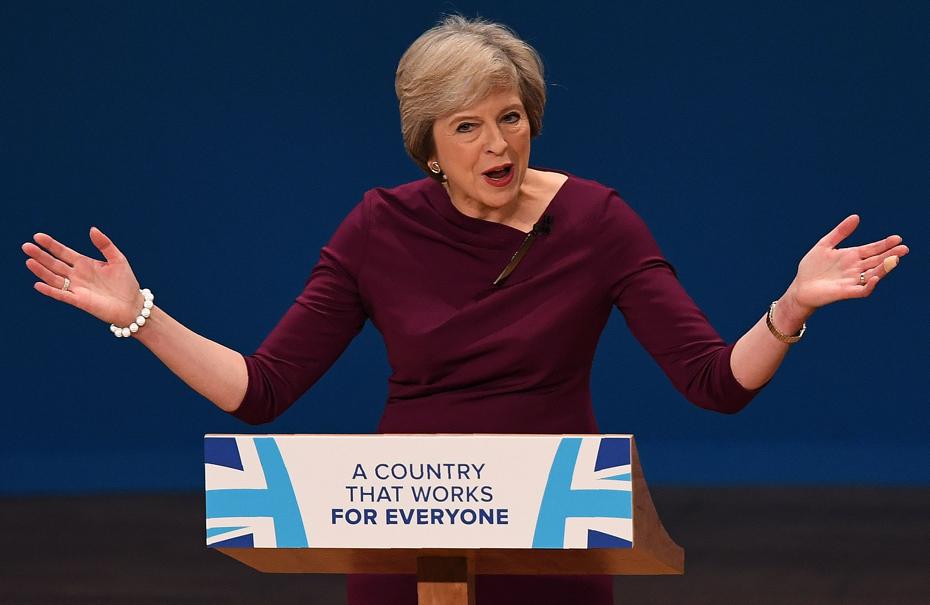LONDON — Prime Minister Theresa May is expected to choose to exit Europe’s single market and its customs union — a so-called hard Brexit, British news reports said Sunday.
May is scheduled to make a long-awaited speech on her plans Tuesday, but the British weekend papers and Sunday news programs reported the main lines of the policy, and some published selected quotations of what May is scheduled to say.
Officially, a government spokesman on Sunday called the reports “speculation’’ and emphasized only the portions of the speech that were leaked by Downing Street itself, with May calling for British unity “to make a success of Brexit and build a truly global Britain.’’
Those extracts were not explicit on the single market or the customs union, but the Sunday newspapers took much the same line: that Britain is headed for a sharp break from the European Union after a transitional period.
Downing Street dislikes the term “hard Brexit,’’ but an outcome along those lines is not unexpected, because it flows logically from the priorities May has set out, particularly about controlling the country’s borders.
Being outside the single market could damage Britain’s important financial services sector and is likely to hit the value of the pound again, at least temporarily.
A week ago, May said in a television interview that post-Brexit Britain would not be able to keep “bits’’ of its EU membership. That, too, was interpreted as a break with the single market, which requires freedom of movement and labor for all citizens of the bloc.
“Often people talk in terms as if somehow we are leaving the EU but we still want to kind of keep bits of membership,’’ she said then. “We are leaving. We are coming out. We are not going to be a member of the EU any longer.’’ She added, “We will be able to have control of our borders, control of our laws.’’
She and her officials have made it clear that her two main priorities are ending the jurisdiction of the European Court of Justice over British law, and restoring British control over its borders and immigration, including from the EU.
Those decisions mean that Britain could no longer be a part of the single market for goods, capital, people, and services of the European Union, because the rules for that market are adjudicated by the European Court of Justice.
The situation is similar for the customs union, which applies only to goods. Membership in the customs union would mean that Britain would have to obey EU regulations on manufacturing standards and would be banned from making separate trade deals with countries — two of the most important reasons pro-Brexit forces have cited for leaving the bloc.
Another implication of leaving the single market and the customs union would be Britain’s desire to negotiate a new trade deal with the European Union as a special partner of some kind, but one different from those held by countries like Norway and Turkey.
It would also seem to mean trying to negotiate a transitional deal with Brussels while the larger trade deal is being haggled out, which could take many years.
Under a transitional deal, which would extend beyond the two-year limit for negotiating the exit, Britain would presumably continue to have a relationship much like the current one, including paying into the EU’s budget.
In an article in The Sunday Times of London, David Davis, the minister in charge of the new Department for Exiting the European Union, wrote that Britain would consider ways to extend or smooth the exit process to provide certainty for businesses.
“If it proves necessary, we have said we will consider time for implementation of new arrangements,’’ he wrote. “We don’t want the EU to fail, we want it to prosper economically and politically, and we need to persuade our allies that a strong new partnership with the UK will help the EU to do that.’’
In a combative interview published Sunday, the chancellor of the Exchequer, Philip Hammond, warned that, if no agreement could be reached on market access, Britain could change its economic model from “European style’’ taxation and regulation to regain competitiveness.
“The British people are not going to lie down and say, ‘Too bad, we’ve been wounded,’ ’’ he said. “We will change our model, and we will come back, and we will be competitively engaged.’’
Those comments, from an interview with the German newspaper Welt am Sonntag, were interpreted as a warning that Britain could use its corporate tax as a form of leverage in Brexit negotiations.




